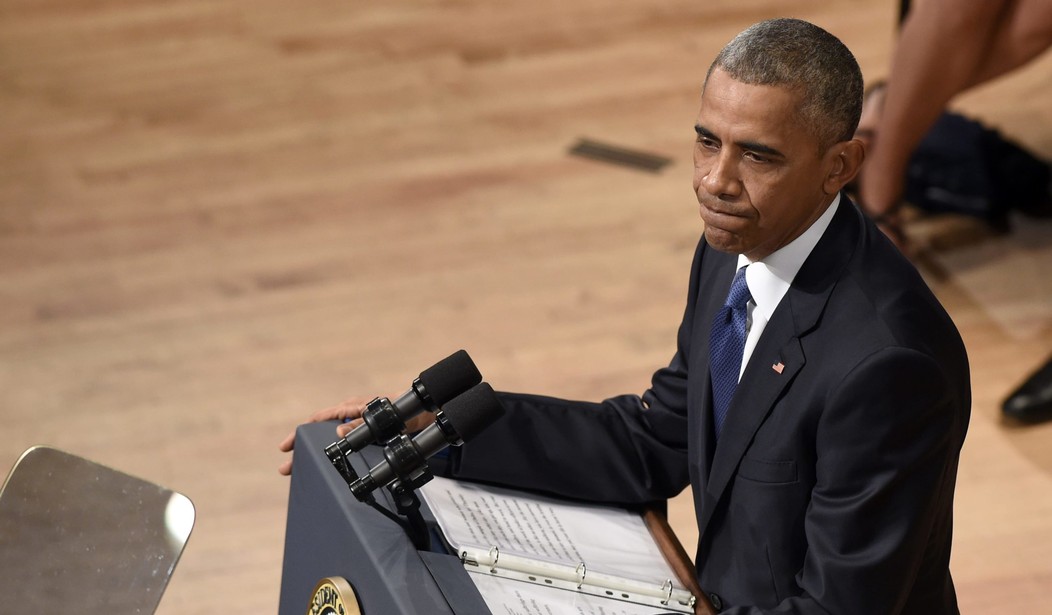In his farewell address, President Obama addressed the issue of immigration with the following statement (via CNN transcript):
For native-born Americans, it means reminding ourselves that the stereotypes about immigrants today were said, almost word for word, about the Irish, and Italians, and Poles — who it was said we’re [sic] going to destroy the fundamental character of America. And as it turned out, America wasn’t weakened by the presence of these newcomers; these newcomers embraced this nation’s creed, and this nation was strengthened.
Given Obama’s abysmal record on immigration through violation of federal immigration laws, I doubt whether he understands the significance of his own words. He, like all of us, recognizes the diversity of immigrants, that everyone who comes here from other nations and cultures brings something unique and valuable.
While stereotypes of anyone — including people in America, such as Southerners (ahem) — should be shunned, we do need to consider the qualities and characteristics of people who come here and measure their influence on the nation as a whole. To wholly embrace everyone as they are, as if everything they bring is a benefit to this nation, would be a mistake.
Let me explain what I mean by referencing commentary on immigration by one of our most compassionate presidents, Thomas Jefferson.
Jefferson welcomed all who wanted to come to the United States and enjoy the freedom and equality it had to offer. “Our country is open to all men, to come and go peaceably, when they choose,” he wrote. He was especially compassionate toward those seeking asylum from troubled lands, saying in a letter that America should open “the doors of hospitality to fugitives from the oppressions of other countries.”
However, his openness to immigration was not absolute, as he always put the principles of America and the safety, even the morality, of her people first.
Every society has a right to fix the fundamental principles of its association, and to say to all individuals, that, if they contemplate pursuits beyond the limits of these principles, and involving dangers which the society chooses to avoid, they must go somewhere else for their exercise; that we want no citizens, and still less ephemeral and pseudo-citizens, on such terms. We may exclude them from our territory, as we do persons infected with disease. We have most abundant resources of happiness within ourselves, which we may enjoy in peace and safety without permitting a few citizens, infected with the mania of rambling and gambling, to bring danger on the great mass engaged in innocent and safe pursuits at home.
In 1782, commenting on rapid immigration in Virginia, Jefferson made some observations that would serve us well in 2017 —particularly those still advocating for open borders. Jefferson guarded against reckless abandon in the name of tolerance when it came to immigration. He recognized the value of immigrants, but he also valued more highly assimilation of immigrants into American culture. In 1817, while commenting on German immigration, he wrote:
It is thought better to discourage their settling together in large masses, wherein, as in our German settlements, they preserve for a long time their own languages, habits, and principles of government, and that they should distribute themselves sparsely among the natives for quicker amalgamation.
I wonder if Obama would have accused Jefferson of encouraging native-born Americans to perpetuate stereotypes when he urged them to discourage German immigrants from holding on to their own languages, habits, and principles of government. Probably so, and he would be wrong to do so because Jefferson offers much wisdom here.
Where an immigrant’s life and culture — and especially his language and views on government — conflict with that of the American culture, which speaks English and holds to democratic-republican principles of government, he should be encouraged (though not forced) to live among the native-born so he can adopt our values and principles.
This still allows for a wide range of cultural differences in so many respects (dress, faith, food, music, arts, etc.). But on certain things — such as those stated by Jefferson — there needs to be a turning from former values and habits to embracing American values and habits. For a society to be unified, there must be common ties that bind; in our society those are our language, commitment to the civil society through good morals and mutual respect, and adoption of the democratic-republican form of government, which is the basis of our freedom and equality.
Jefferson considered these to be central to assimilation. Obama touched on this point when he said, “these newcomers embraced this nation’s creed, and this nation was strengthened.” Exactly how Obama defines our creed, given his progressive record, is up for debate. But if his point is that immigrants embrace our principles of government that promote individual liberty and equal justice before the law as established by our founders, then he is right.
Jefferson believed that having common principles of government was just as important for the maintenance of America liberty as a common language (English). He elaborates on this point in his remarks about immigration in Virginia in 1782. He writes that for a society to be peaceful and united, it must “harmonize as much as possible in matters which they must of necessity transact together.” The civil government, he wrote, is one of the primary points of contact for all citizens because “its administration must be conducted by common consent.” This is why it’s so important that we agree on foundational principles of governance. We must if we’re going to be a unified, functioning, and civil society.
However, immigrants sometimes either don’t understand or share our principles of governance. This is not a slight to them; it’s inevitable since they come from places that do not share our form of government. They simply have not experienced it, and without a thoughtful decision to turn from their old forms of government and embrace America’s principles of republicanism, they will not be a beneficial addition to our society.
This is why anyone who becomes a citizen must pass a naturalization test on American civics. They must also be able to speak, read, and write English. If we have a nation with too many illegal immigrations who have never been required to pass these tests, this has a corrosive effect on the stability of American society. The same is true of immigrants who become citizens but then do not abandon their old language or commitments to former principles of government that are contrary to American republicanism.
Jefferson understood (as we all should) that America’s system is quite unique. “It is a composition of the freest principles of the English constitution, with others derived from natural right and natural reason,” he wrote. Other governing principles — various forms of socialism, communism, monarchy, and any form of totalitarianism — are opposed to our republican values. Even if they’re not completely hostile, still none are like the principles of liberty established in America’s Constitution.
Yet, it is with these foreign principles that most immigrants come. This, Jefferson said, can be problematic if immigrants come in great numbers, group together to reinforce former principles, and fail to truly adopt America’s form of government.
They will bring with them the principles of the governments they leave, imbibed in their early youth; or, if able to throw them off, it will be in exchange for an unbounded licentiousness, passing, as is usual, from one extreme to another. It would be a miracle were they to stop precisely at the point of temperate liberty. These principles, with their language, they will transmit to their children. In proportion to their number, they will share with us the legislation. They will infuse into it their spirit, warp and bias its direction, and render it a heterogeneous, incoherent, distracted mass.
While America is much more populated today, thus preventing so great a negative impact when immigrants fail to disseminate among the native born, Jefferson’s concerns have merit today. More and more immigrants are coming here and grouping together, often keeping their own language without intent to change it (aiming, instead, to change the English-speaking society to adopt their language), and failing to abandon principles of governance that are contrary to America’s republicanism (this, sadly, is encouraged by a public school system which has also greatly abandoned republicanism for progressivism and various forms of socialism).
Whether in 1789 or 2017, mass immigration without appreciation of language, culture, and our government principles will result in a loss of liberty because the civil society will become balkanized and hostile, encouraging the expansion of a powerful government to bring order.
While Jefferson supported immigrants coming to America through regular channels, he opposed “inviting them by extraordinary encouragements.” He was not advocating stopping immigration, but simply doing it right. While he supported immigrants coming who were skilled laborers and added to the productivity of society, he firmly rejected those who would replace American workers and who did not add to our society in a beneficial way.
Jefferson’s views on immigration, which were reflected by most of the founders and many throughout American history, should serve as an encouragement to those who are being accused of “white nationalism” or bigotry because they want to maintain an American culture. And, yes, there is an American culture, as Jefferson explained — one that is born of a common tongue, devoted to enriching the civil society through morality and equal treatment of all, and committed to principles of liberty as reflected in a republican form of government that limits centralized power and respects the rights of the individual (as well as those of the states).








Join the conversation as a VIP Member